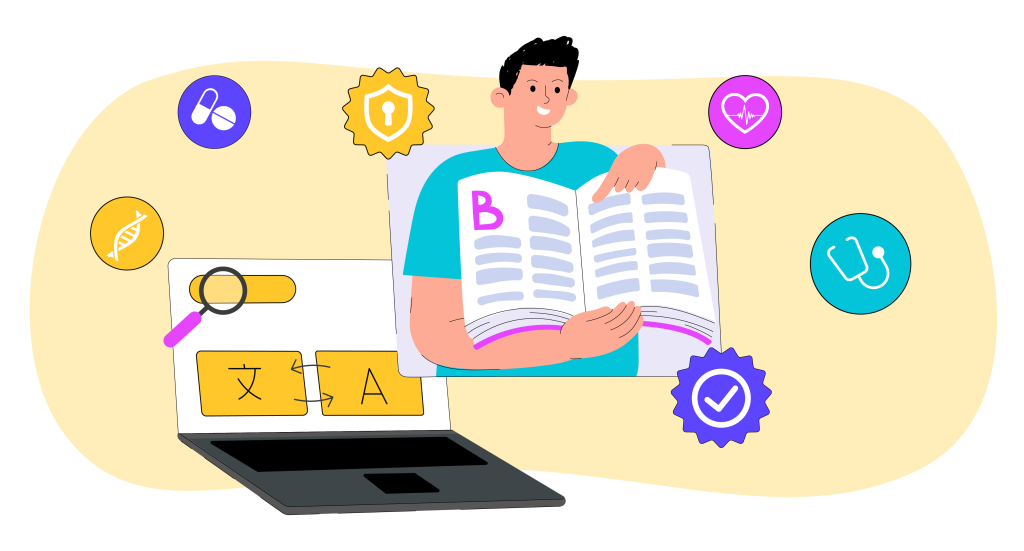In healthcare, every single word matters. It can shape a diagnosis, impact a treatment plan, or change a patient’s life.
A study has found that the majority of medical errors with negative effects were associated with mistranslation. As healthcare becomes more global, the need for precise and culturally aware medical translation has never been greater. A single mistranslation — say “infection” instead of “inflammation” — can have life-threatening consequences and serious legal implications.
That’s why choosing the right medical translation agency isn’t just a business decision — it’s a responsibility. The right partner ensures your reports, device manuals, and consent forms are accurate, compliant, and easy to understand in any language.
In this guide, we’ll walk you through what truly matters when selecting a medical translation partner — the must-haves, the red flags, and how to make a choice that protects both your patients and your reputation.
Key Factors to Consider When Choosing a Medical Translation Agency
We have compiled a list of important factors that you should consider:
Specialized and Qualified Medical Translators
Medical translation isn’t just about language — it’s about understanding anatomy, pharmacology, and procedures. Choose agencies whose translators have backgrounds in life sciences or healthcare and a strong portfolio in your field.
Specialized medical translation companies employ a qualified team of translators with a background in life sciences or healthcare. They possess an excellent track record of translating clinical and pharmaceutical documents and are proficient in the given source and target languages.
Medical translators understand the nuances of healthcare terminology, cultural context, and local practices in the target market. This ensures that your translated content preserves the underlying scientific and clinical meaning.
What to Look For:
- Specialized medical translation with a qualified team
- Experience in oncology, cardiology, neurology, and other medical fields
- Native language proficiency in the target languages
- Subject-matter expertise and a strong portfolio of medical translations
Certifications and Quality Standards
The healthcare and medical sectors are highly regulated and bound by some mandatory and good-to-have certifications. Healthcare service providers should choose a vendor who understands the regulatory landscape to carry out medical translation.
The following certificates and compliances ensure your medical and healthcare translation follows a standardized process. The qualified translators of a specialized company will handle your projects, reducing the risk of errors and providing you with peace of mind.
Certificates and Compliances to Look For:
- ISO 17100:2015 – This is a mandatory ISO certificate for medical translation service providers to ensure they follow a rigorous, documented process.
- ISO 13485 – This is the standard for medical device quality management, and a good to have for agencies handling medical device translation projects.
- HIPAA Compliance – HIPAA compliance ensures that your patients’ sensitive data is handled with utmost security and confidentiality.
- Other Standards – Additionally, the medical translation company should also comply with quality and security standards of GDPR, FDA, NHS, and others.
A Rigorous Quality Assurance Process
Assessing the quality of translation matters a lot in the global landscape and should go beyond basic proofreading. Given the critical nature of medical content, agencies must implement a multi-layered QA process to catch errors at every stage for top-notch medical translation quality.
Components of a Comprehensive QA Process:
- Pre-translation Preparation: This step includes thoroughly reviewing the source documents, creating project-specific glossaries, establishing style guidelines, and gathering relevant medical references.
- Quality Control During Translation: Assigning translators based on the project’s specific requirements, using approved translation memories, and checking quality during translation.
- Post-translation Review: A meticulous review after translation includes checks for precision, completeness, and adherence to guidelines.
- Final QA & Improvement: This is the final step where any remaining errors or inconsistencies are eliminated. It also includes making necessary revisions as per the client feedback and formal sign-off before delivery.
Tech-savviness of Translation Agency
The technology and modern tools are pivotal in enhancing translation efficiency. If you’re translating 1,000 patient records, CAT (Computer-Assisted Tools) tools help keep terminology consistent across all documents.
Additionally, the vendor of your choice should be familiar with the glossary and translation memory. A glossary is a list of words specific to your brand or healthcare service with their approved translation in the target language.
Translation Memory (TM) ensures you don’t pay twice for translating the common phrases, saving you time and money. Using CAT tools, you can effortlessly manage Glossary & Translation Memory to maintain consistency across long-term projects and multiple documents.
Client Testimonials & Industry Reputation
Experience speaks louder than marketing. Before signing on, review case studies and testimonials to gauge an agency’s credibility and reliability.
What to Look for:
- Testimonials that include details about the kind of translation projects they’ve handled previously.
- Testimonials from pharmaceutical and medical device manufacturers are the most relevant ones.
- Testimonials mentioning long-term partnership, indicating the consistent quality and reliability.
Red Flags to Avoid While Choosing a Medical Translation Company
Choosing the wrong medical translation agency can lead to reputation damage and even legal or social complications. Here are a few red flags or warning signs to help you reconsider your choice:
- No medical specialization: Medical specialization is one of the most critical factors to consider when looking for a translation agency. Never make the mistake of choosing a vendor with no medical specialization or one that hasn’t worked on a healthcare translation project previously.
- Lack of certifications or regulatory compliance: The company lacks the required ISO certificates for medical translation services and is unable to show HIPAA compliance.
- Over-reliance on machine translation without expert review: The company’s over-reliance on AI translation indicates that they have a lack of professional medical translators.
- Poor communication & project management: Slow responses, unclear communication, and clunky project management processes will lead to poor-quality deliverables.
- Unrealistic pricing or promise: Cheap products are cheaper for a reason. Medical translation is complex and requires the highest level of acumen and precision. Companies promising fast turnaround time at lower prices are red flags to avoid.
- No portfolio or industry experience: The vendor doesn’t have a demonstrable portfolio or projects to showcase their expertise. They’ve a team of translators with limited understanding of medical terminology and necessary experience.
Conclusion
Choosing the right medical translation agency means choosing safety, accuracy, and trust.
In a field where a misplaced word can change everything, you need more than a vendor — you need a partner who understands both medicine and meaning.
At Translate By Humans, we bring together certified translators, medical subject-matter experts, and rigorous quality checks to deliver translations that are precise, compliant, and invisible in the best possible way — they simply work.
If you’re looking for a translation team that treats your words with the care your patients deserve, reach out to us for a free quote or schedule a consultation. Let’s make your communication as accurate and human as the care you deliver.
FAQs
1. What is medical translation?
Medical translation is the process of translating your medical and healthcare documents, such as clinical trial reports, device manuals, patient records, and consent forms.
It’s a complex process that requires maintaining precision, cultural context, and regulatory compliance. Translators are required to have a deep understanding of the field along with linguistic skills in both source and target languages.
2. What are the benefits of using an experienced medical translation agency?
Specialized agencies have a network of dedicated medical translators ready to work on your project by following standards like ISO 17100. This helps ensure compliance with healthcare and legal regulations while reducing the risks of errors.
3. How much does a medical translation cost?
Pricing of medical translation projects varies depending on the complexity, language pair, and content type. Standard projects may cost from $0.05-$0.15/word, while complex projects may cost more. While more expensive than generic translation, specialized medical translation is a necessary investment for safety and compliance.
4. What’s the difference between a medical interpreter and a translator?
Translators work with written medical content and documents, while medical interpreters facilitate the real-time translation of verbal communication between two parties, including doctor-patient consultations or healthcare meetings.


